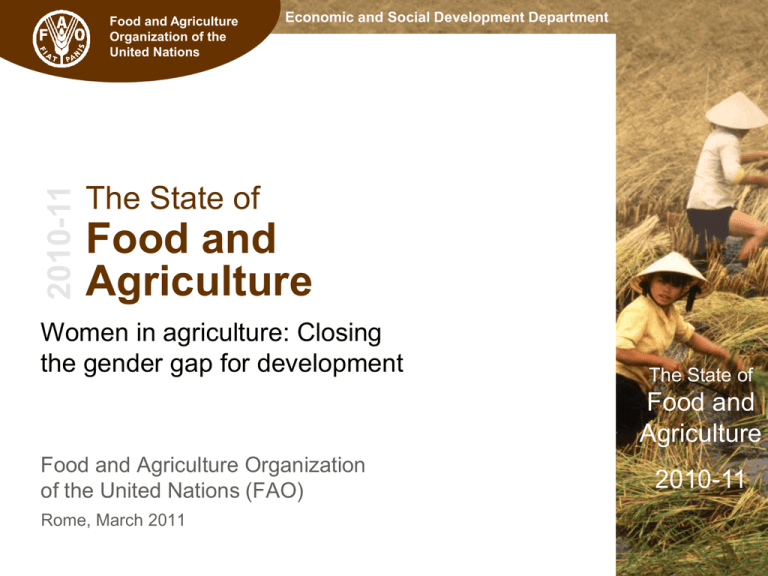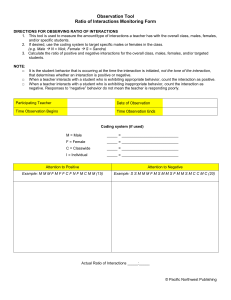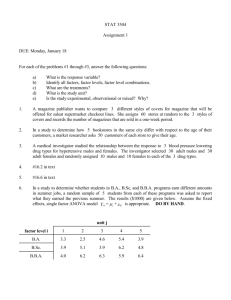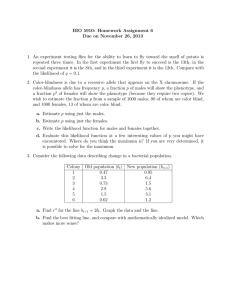View the presentation delivered by speaker Dr. Marcela Villarreal
advertisement

2010-11 Food and Agriculture Organization of the United Nations Economic and Social Development Department The State of Food and Agriculture Women in agriculture: Closing the gender gap for development The State of Food and Agriculture Food and Agriculture Organization of the United Nations (FAO) Rome, March 2011 2010-11 Food and Agriculture Organization of the United Nations Economic and Social Development Department The agriculture sector in developing countries is underperforming, in part because women are denied the resources and opportunities they need to be more productive. The State of Food and Agriculture 2010-11 Food and Agriculture Organization of the United Nations Economic and Social Development Department Gains from closing the gender gap Productivity gains • 20 to 30 percent on women’s farms • 2.5 to 4 percent at national level Food security gains • 12 to 17 percent reduction in the number of hungry • 100 to 150 million people lifted out of hunger Broader economic and social gains • Better health, nutrition and education outcomes for children • Higher human capital, which promotes economic growth The State of Food and Agriculture 2010-11 Economic and Social Development Department Food and Agriculture Organization of the United Nations Developing countries SubSaharan Africa Latin America and the Agriculture East and Southeast Asia Industry Services Females Males Females Males Females Males Females Males Females Males Females 90% 80% 70% 60% 50% 40% 30% 20% 10% 0% Males % of total male and female population Employment rates by sector The State of Near East South Asia Food and and North Agriculture Africa 2010-11 Source: ILO, Key Indicators of the Labour Market (KILM, 6th Edition). Note: The ILO, KILM data covers only a subset of the countries in each region. Definitions of adult labour force differ by country, but usually refers to the population aged 15 and above. Employed includes self-employed, employed, employers as well as contributing family members. There is no distinction between formal sector employment and informal sector employment. Food and Agriculture Organization of the United Nations Economic and Social Development Department Women are a key resource in agriculture The State of Food and Agriculture 2010-11 Source: ILO. Share of employed population by sector and gender Food and Agriculture Organization of the United Nations Economic and Social Development Department Women farmers produce less... The State of Food and Agriculture 2010-11 Food and Agriculture Organization of the United Nations Economic and Social Development Department because they operate smaller farms… The State of Food and Agriculture 2010-11 Food and Agriculture Organization of the United Nations Economic and Social Development Department …and use less fertilizer The State of Food and Agriculture 2010-11 Food and Agriculture Organization of the United Nations Economic and Social Development Department Policies can make a difference Good agricultural policy must consider gender differences Ensure equality for women under the law Invest in the human capital of women and girls The State of Address the multiple constraints of women in agriculture holistically Food and Agriculture Provide public services and technologies to free up women’s time 2010-11 Food and Agriculture Organization of the United Nations Economic and Social Development Department For more information The State of Food and Agriculture Women in agriculture: Closing the gender gap for development FAO‘s major annual flagship publication. The State of Available in English, French, Spanish, Russian, Arabic and Chinese www.fao.org/publications/sofa Food and Agriculture 2010-11




